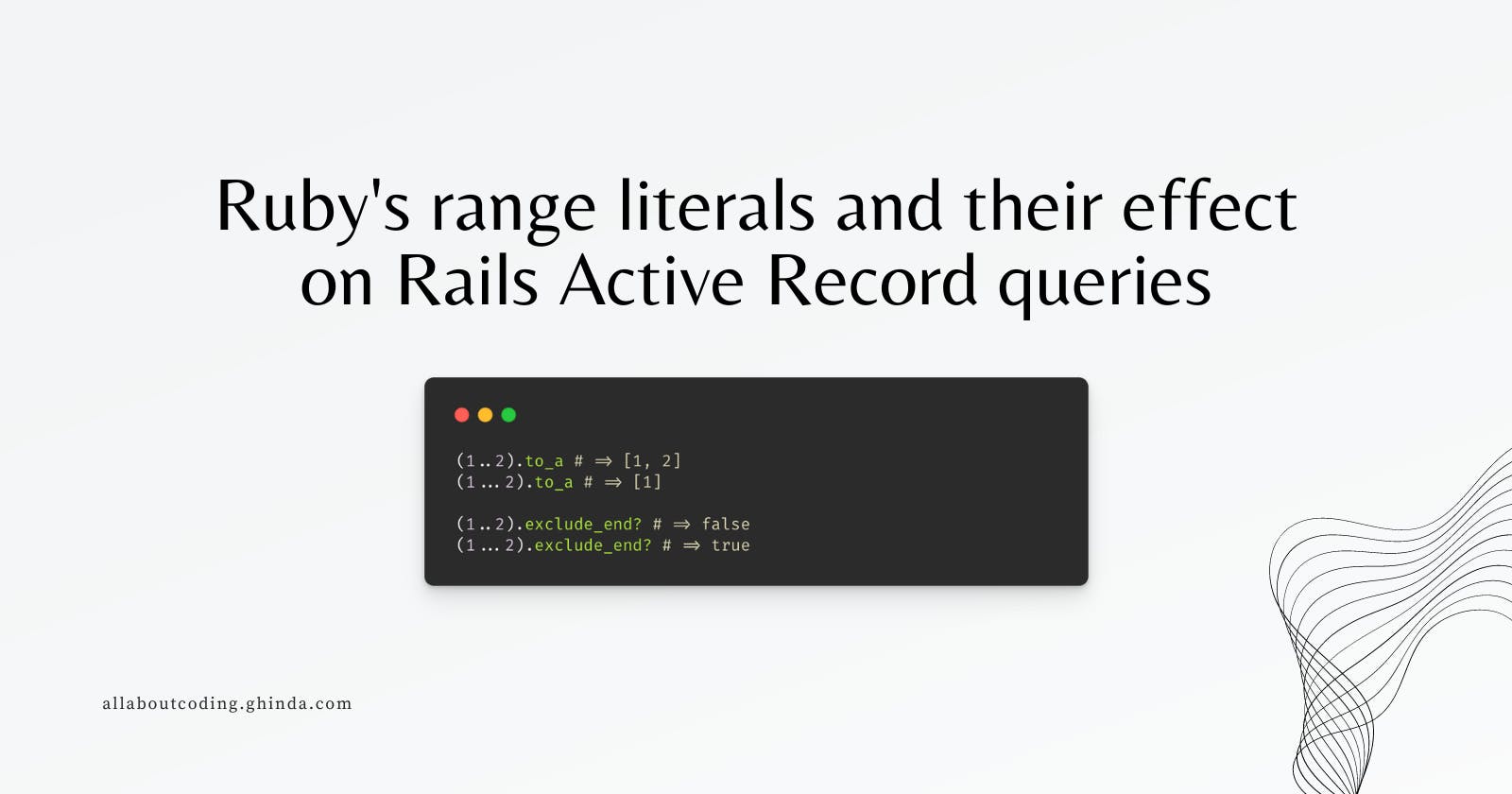Ruby's range literals and their effect on Rails Active Record queries
Learn about the difference between inclusive and exclusive end ranges and the SQL queries each choice produces
The following Active Record query:
User.where(created_at: 1.day.ago...Time.current).to_sql
will generate this SQL:
SELECT
"users".*
FROM
"users"
WHERE
"users"."created_at" >= '2023-06-21 06:38:26.330063'
AND
"users"."created_at" < '2023-06-22 06:38:26.330184'
While the following Active Record query:
User.where(created_at: Date.current.all_day).to_sql
will generate the following SQL:
SELECT
"users".*
FROM
"users"
WHERE
"users"."created_at" BETWEEN '2023-06-21 21:00:00' AND '2023-06-22 20:59:59.999999'
I noticed this difference while having a discussion with Cosmin Stamate and Jakob Cosoroabă on a Discord group about data ranges.
Thus I started asking myself:
Why is there a difference?
Why use
BETWEENin the second example or why not use it in the first example?
And had a hint that it must be related to ranges and the inclusion/exclusion of their ends.
To answer these questions, we need to explore the following concepts:
What is
BETWEENdoing in PostgreSQL?What does
.all_daydo?What is the difference between
...and..?
PostgreSQL BETWEEN
This is straightforward. According to the PostgreSQL documentation on function comparisons, BETWEEN includes its endpoints:
What does all_day do?
.all_day seems to be defined in ActiveSupport:
# Source: https://github.com/rails/rails/blob/main/activesupport/lib/active_support/core_ext/date_and_time/calculations.rb#L310
def all_day
beginning_of_day..end_of_day
end
So it is a range literal that includes its end value.
What is the difference between ... and .. ?
Here is what Ruby 3.2 documentation defines Range Literals:
A range has a starting point and an endpoint. Different from the math notation of using (.) to signify that the endpoints are not included and [.] to signify that the endpoints are included, in Ruby both .. and ... include the start point.
The difference between them is with regards to the endpoint:
..includes its ending value...does NOT include its ending value
(1..2).to_a # => [1, 2]
(1...2).to_a # => [1]
They even have a method to tell you that:
(1..2).exclude_end? # => false
(1...2).exclude_end? # => true
So, why is the difference in SQL for .all_day vs 1.day.ago ...Time.current
The difference is that all_day uses an inclusive end range and 1.day.ago ... Time.current is an exclusive end range.
(1.day.ago...Time.current).exclusive_end? # => true
Date.current.all_day.exclusive_end? # => false
Thus in the case when using an inclusive end range, Active Record will generate an SQL statement with BETWEEN and when using an exclusive end range it will use the normal comparison >= AND < SQL statement.
Let's make the calls explicit. Here is the SQL query when using the exclusive end range:
User.
where(created_at: 1.day.ago.beginning_of_day ... 1.day.ago.end_of_day).
to_sql
# will generate the following statement
# please keep in mind this is executed with
# Europe/Bucharest set as time zone
SELECT "users".* FROM "users"
WHERE
"users"."created_at" >= '2023-06-21 21:00:00'
AND
"users"."created_at" < '2023-06-22 20:59:59.999999'
Here is the query using inclusive end range:
User.
where(created_at: 1.day.ago.beginning_of_day .. 1.day.ago.end_of_day).
to_sql
# will generate the following statement
# please keep in mind this is executed with
# Europe/Bucharest set as time zone
SELECT "users".* FROM "users"
WHERE
"users"."created_at" BETWEEN '2023-06-21 21:00:00' AND '2023-06-22 20:59:59.999999'
What about using AREL?
It will do the same thing:
users = User.arel_table
users.
project(Arel.star).
where(
users[:created_at].between(1.day.ago.beginning_of_day ... 1.day.ago.end_of_day)
).to_sql
# will print
SELECT "users".* FROM "users"
WHERE
"users"."created_at" >= '2023-06-21 21:00:00'
AND
"users"."created_at" < '2023-06-22 20:59:59.999999'
# while using inclusive end range
users.
project(Arel.star).
where(
users[:created_at].between(1.day.ago.beginning_of_day .. 1.day.ago.end_of_day)
).to_sql
# will print
SELECT "users".* FROM "users"
WHERE
"users"."created_at" BETWEEN '2023-06-21 21:00:00' AND '2023-06-22 20:59:59.999999'
Enjoyed this article?
Join my Short Ruby News newsletter for weekly Ruby updates. Also, check out my co-authored book, LintingRuby, for insights on automated code checks. For more Ruby learning resources, visit rubyandrails.info.



